Detailed Analysis of the Global Events Management Industry Report
VerifiedAdded on 2023/01/06
|10
|2946
|91
Report
AI Summary
This report provides a detailed analysis of the global events management industry. It begins with an introduction to event management, defining it as the application of project management theories to real-life events, including planning, budgeting, and coordination. Part A explores the structure and role of the event management industry, categorizing events by type (corporate vs. private), size (local, hallmark, major, mega), and purpose (commercial vs. non-commercial). It also examines factors affecting the industry, including its historical evolution and the impact of globalization. The report further discusses the value, impacts, and legacy of global events, emphasizing their influence on various industries and the environment, as well as management policies and strategies. Part B, covered in a PPT, is not detailed in the document. The report concludes with a summary of the key findings and includes a list of references.

Global Events
1
1
Paraphrase This Document
Need a fresh take? Get an instant paraphrase of this document with our AI Paraphraser
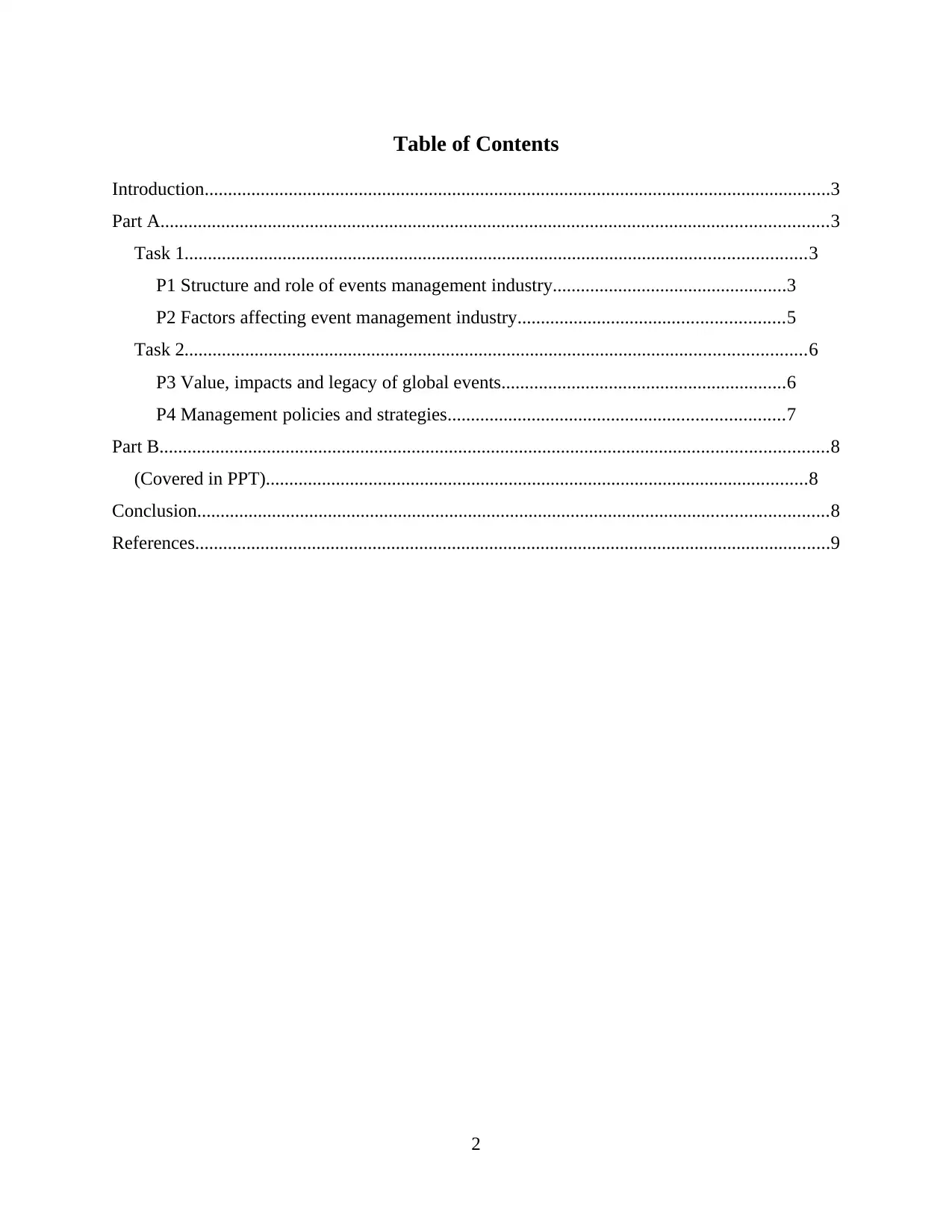
Table of Contents
Introduction......................................................................................................................................3
Part A...............................................................................................................................................3
Task 1.....................................................................................................................................3
P1 Structure and role of events management industry..................................................3
P2 Factors affecting event management industry.........................................................5
Task 2.....................................................................................................................................6
P3 Value, impacts and legacy of global events.............................................................6
P4 Management policies and strategies........................................................................7
Part B...............................................................................................................................................8
(Covered in PPT)....................................................................................................................8
Conclusion.......................................................................................................................................8
References........................................................................................................................................9
2
Introduction......................................................................................................................................3
Part A...............................................................................................................................................3
Task 1.....................................................................................................................................3
P1 Structure and role of events management industry..................................................3
P2 Factors affecting event management industry.........................................................5
Task 2.....................................................................................................................................6
P3 Value, impacts and legacy of global events.............................................................6
P4 Management policies and strategies........................................................................7
Part B...............................................................................................................................................8
(Covered in PPT)....................................................................................................................8
Conclusion.......................................................................................................................................8
References........................................................................................................................................9
2
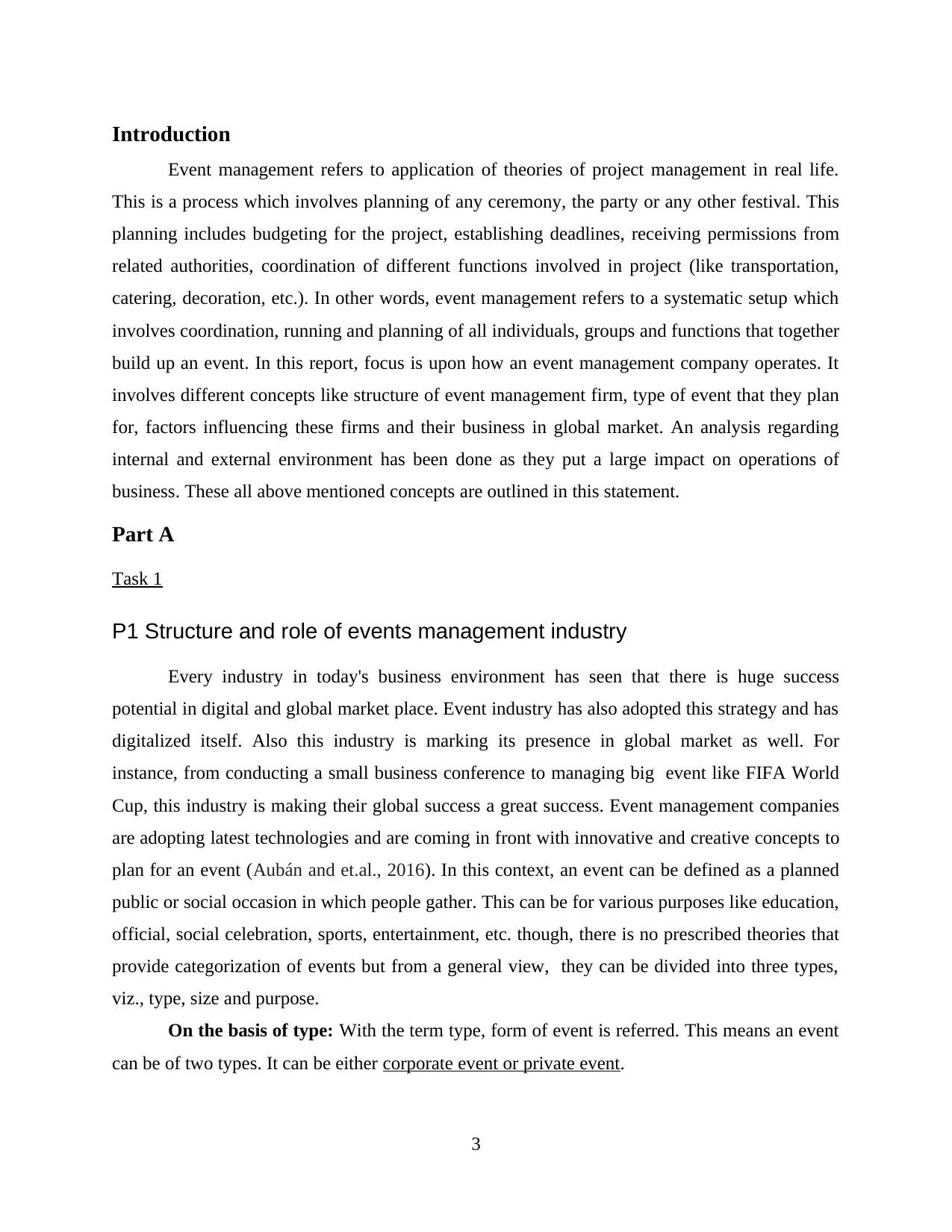
Introduction
Event management refers to application of theories of project management in real life.
This is a process which involves planning of any ceremony, the party or any other festival. This
planning includes budgeting for the project, establishing deadlines, receiving permissions from
related authorities, coordination of different functions involved in project (like transportation,
catering, decoration, etc.). In other words, event management refers to a systematic setup which
involves coordination, running and planning of all individuals, groups and functions that together
build up an event. In this report, focus is upon how an event management company operates. It
involves different concepts like structure of event management firm, type of event that they plan
for, factors influencing these firms and their business in global market. An analysis regarding
internal and external environment has been done as they put a large impact on operations of
business. These all above mentioned concepts are outlined in this statement.
Part A
Task 1
P1 Structure and role of events management industry
Every industry in today's business environment has seen that there is huge success
potential in digital and global market place. Event industry has also adopted this strategy and has
digitalized itself. Also this industry is marking its presence in global market as well. For
instance, from conducting a small business conference to managing big event like FIFA World
Cup, this industry is making their global success a great success. Event management companies
are adopting latest technologies and are coming in front with innovative and creative concepts to
plan for an event (Aubán and et.al., 2016). In this context, an event can be defined as a planned
public or social occasion in which people gather. This can be for various purposes like education,
official, social celebration, sports, entertainment, etc. though, there is no prescribed theories that
provide categorization of events but from a general view, they can be divided into three types,
viz., type, size and purpose.
On the basis of type: With the term type, form of event is referred. This means an event
can be of two types. It can be either corporate event or private event.
3
Event management refers to application of theories of project management in real life.
This is a process which involves planning of any ceremony, the party or any other festival. This
planning includes budgeting for the project, establishing deadlines, receiving permissions from
related authorities, coordination of different functions involved in project (like transportation,
catering, decoration, etc.). In other words, event management refers to a systematic setup which
involves coordination, running and planning of all individuals, groups and functions that together
build up an event. In this report, focus is upon how an event management company operates. It
involves different concepts like structure of event management firm, type of event that they plan
for, factors influencing these firms and their business in global market. An analysis regarding
internal and external environment has been done as they put a large impact on operations of
business. These all above mentioned concepts are outlined in this statement.
Part A
Task 1
P1 Structure and role of events management industry
Every industry in today's business environment has seen that there is huge success
potential in digital and global market place. Event industry has also adopted this strategy and has
digitalized itself. Also this industry is marking its presence in global market as well. For
instance, from conducting a small business conference to managing big event like FIFA World
Cup, this industry is making their global success a great success. Event management companies
are adopting latest technologies and are coming in front with innovative and creative concepts to
plan for an event (Aubán and et.al., 2016). In this context, an event can be defined as a planned
public or social occasion in which people gather. This can be for various purposes like education,
official, social celebration, sports, entertainment, etc. though, there is no prescribed theories that
provide categorization of events but from a general view, they can be divided into three types,
viz., type, size and purpose.
On the basis of type: With the term type, form of event is referred. This means an event
can be of two types. It can be either corporate event or private event.
3
⊘ This is a preview!⊘
Do you want full access?
Subscribe today to unlock all pages.

Trusted by 1+ million students worldwide
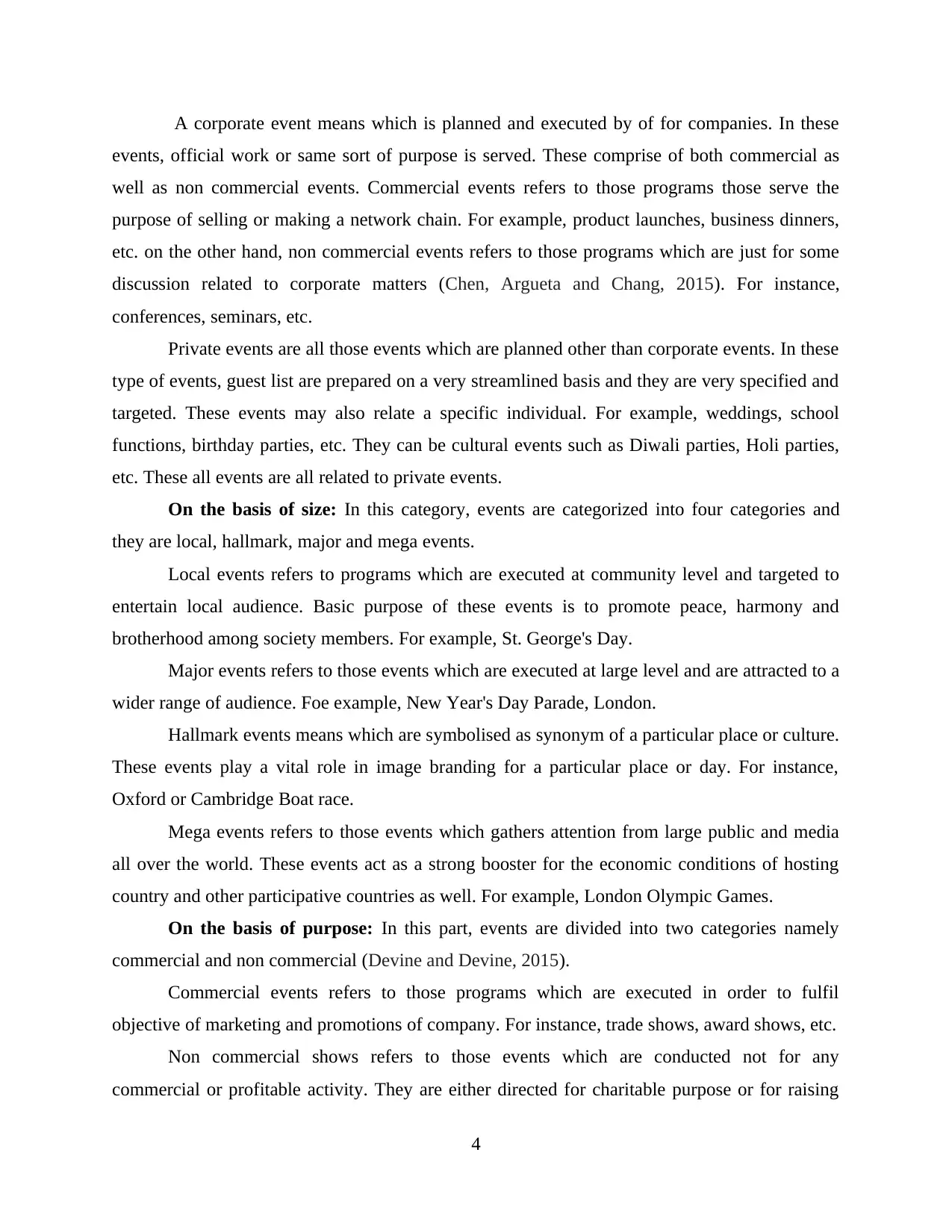
A corporate event means which is planned and executed by of for companies. In these
events, official work or same sort of purpose is served. These comprise of both commercial as
well as non commercial events. Commercial events refers to those programs those serve the
purpose of selling or making a network chain. For example, product launches, business dinners,
etc. on the other hand, non commercial events refers to those programs which are just for some
discussion related to corporate matters (Chen, Argueta and Chang, 2015). For instance,
conferences, seminars, etc.
Private events are all those events which are planned other than corporate events. In these
type of events, guest list are prepared on a very streamlined basis and they are very specified and
targeted. These events may also relate a specific individual. For example, weddings, school
functions, birthday parties, etc. They can be cultural events such as Diwali parties, Holi parties,
etc. These all events are all related to private events.
On the basis of size: In this category, events are categorized into four categories and
they are local, hallmark, major and mega events.
Local events refers to programs which are executed at community level and targeted to
entertain local audience. Basic purpose of these events is to promote peace, harmony and
brotherhood among society members. For example, St. George's Day.
Major events refers to those events which are executed at large level and are attracted to a
wider range of audience. Foe example, New Year's Day Parade, London.
Hallmark events means which are symbolised as synonym of a particular place or culture.
These events play a vital role in image branding for a particular place or day. For instance,
Oxford or Cambridge Boat race.
Mega events refers to those events which gathers attention from large public and media
all over the world. These events act as a strong booster for the economic conditions of hosting
country and other participative countries as well. For example, London Olympic Games.
On the basis of purpose: In this part, events are divided into two categories namely
commercial and non commercial (Devine and Devine, 2015).
Commercial events refers to those programs which are executed in order to fulfil
objective of marketing and promotions of company. For instance, trade shows, award shows, etc.
Non commercial shows refers to those events which are conducted not for any
commercial or profitable activity. They are either directed for charitable purpose or for raising
4
events, official work or same sort of purpose is served. These comprise of both commercial as
well as non commercial events. Commercial events refers to those programs those serve the
purpose of selling or making a network chain. For example, product launches, business dinners,
etc. on the other hand, non commercial events refers to those programs which are just for some
discussion related to corporate matters (Chen, Argueta and Chang, 2015). For instance,
conferences, seminars, etc.
Private events are all those events which are planned other than corporate events. In these
type of events, guest list are prepared on a very streamlined basis and they are very specified and
targeted. These events may also relate a specific individual. For example, weddings, school
functions, birthday parties, etc. They can be cultural events such as Diwali parties, Holi parties,
etc. These all events are all related to private events.
On the basis of size: In this category, events are categorized into four categories and
they are local, hallmark, major and mega events.
Local events refers to programs which are executed at community level and targeted to
entertain local audience. Basic purpose of these events is to promote peace, harmony and
brotherhood among society members. For example, St. George's Day.
Major events refers to those events which are executed at large level and are attracted to a
wider range of audience. Foe example, New Year's Day Parade, London.
Hallmark events means which are symbolised as synonym of a particular place or culture.
These events play a vital role in image branding for a particular place or day. For instance,
Oxford or Cambridge Boat race.
Mega events refers to those events which gathers attention from large public and media
all over the world. These events act as a strong booster for the economic conditions of hosting
country and other participative countries as well. For example, London Olympic Games.
On the basis of purpose: In this part, events are divided into two categories namely
commercial and non commercial (Devine and Devine, 2015).
Commercial events refers to those programs which are executed in order to fulfil
objective of marketing and promotions of company. For instance, trade shows, award shows, etc.
Non commercial shows refers to those events which are conducted not for any
commercial or profitable activity. They are either directed for charitable purpose or for raising
4
Paraphrase This Document
Need a fresh take? Get an instant paraphrase of this document with our AI Paraphraser
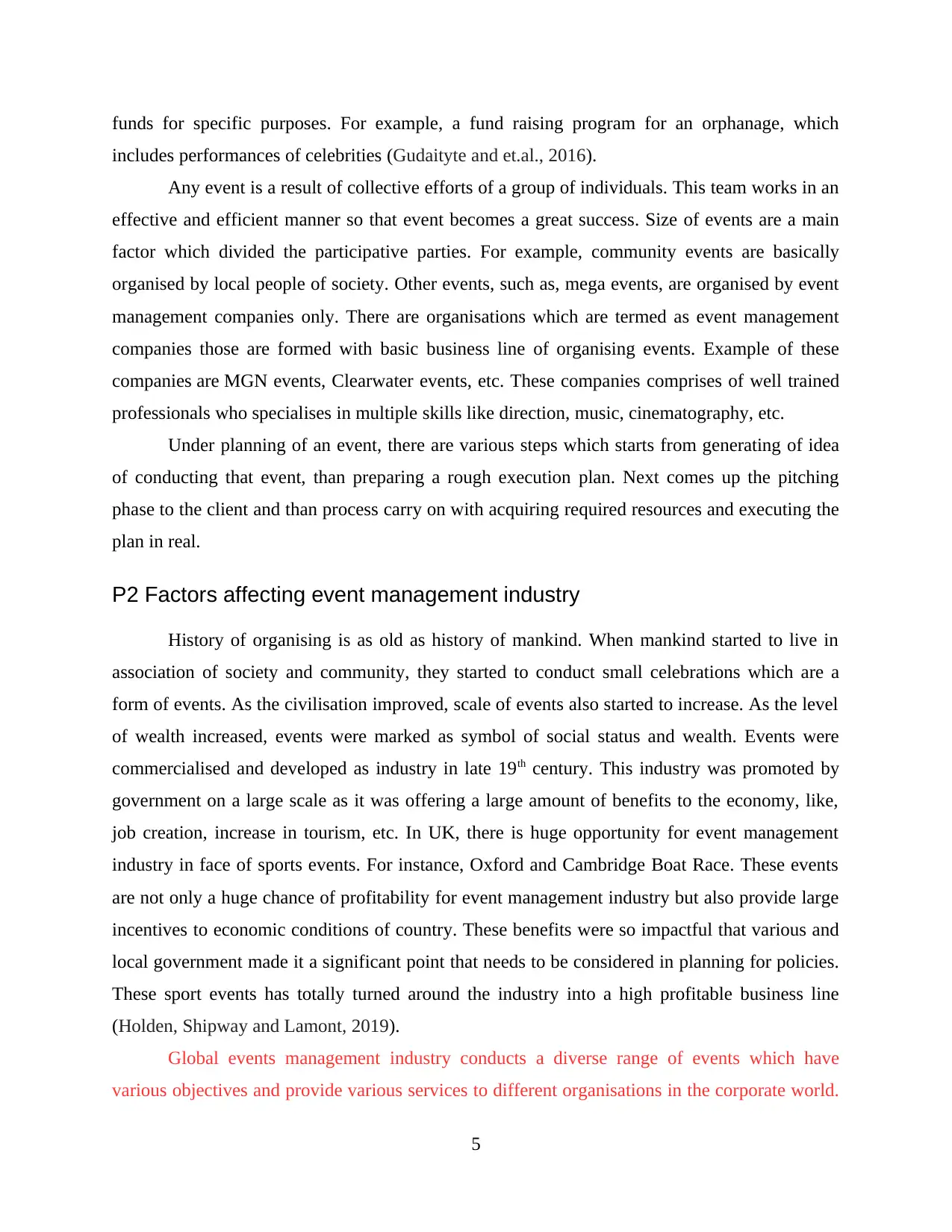
funds for specific purposes. For example, a fund raising program for an orphanage, which
includes performances of celebrities (Gudaityte and et.al., 2016).
Any event is a result of collective efforts of a group of individuals. This team works in an
effective and efficient manner so that event becomes a great success. Size of events are a main
factor which divided the participative parties. For example, community events are basically
organised by local people of society. Other events, such as, mega events, are organised by event
management companies only. There are organisations which are termed as event management
companies those are formed with basic business line of organising events. Example of these
companies are MGN events, Clearwater events, etc. These companies comprises of well trained
professionals who specialises in multiple skills like direction, music, cinematography, etc.
Under planning of an event, there are various steps which starts from generating of idea
of conducting that event, than preparing a rough execution plan. Next comes up the pitching
phase to the client and than process carry on with acquiring required resources and executing the
plan in real.
P2 Factors affecting event management industry
History of organising is as old as history of mankind. When mankind started to live in
association of society and community, they started to conduct small celebrations which are a
form of events. As the civilisation improved, scale of events also started to increase. As the level
of wealth increased, events were marked as symbol of social status and wealth. Events were
commercialised and developed as industry in late 19th century. This industry was promoted by
government on a large scale as it was offering a large amount of benefits to the economy, like,
job creation, increase in tourism, etc. In UK, there is huge opportunity for event management
industry in face of sports events. For instance, Oxford and Cambridge Boat Race. These events
are not only a huge chance of profitability for event management industry but also provide large
incentives to economic conditions of country. These benefits were so impactful that various and
local government made it a significant point that needs to be considered in planning for policies.
These sport events has totally turned around the industry into a high profitable business line
(Holden, Shipway and Lamont, 2019).
Global events management industry conducts a diverse range of events which have
various objectives and provide various services to different organisations in the corporate world.
5
includes performances of celebrities (Gudaityte and et.al., 2016).
Any event is a result of collective efforts of a group of individuals. This team works in an
effective and efficient manner so that event becomes a great success. Size of events are a main
factor which divided the participative parties. For example, community events are basically
organised by local people of society. Other events, such as, mega events, are organised by event
management companies only. There are organisations which are termed as event management
companies those are formed with basic business line of organising events. Example of these
companies are MGN events, Clearwater events, etc. These companies comprises of well trained
professionals who specialises in multiple skills like direction, music, cinematography, etc.
Under planning of an event, there are various steps which starts from generating of idea
of conducting that event, than preparing a rough execution plan. Next comes up the pitching
phase to the client and than process carry on with acquiring required resources and executing the
plan in real.
P2 Factors affecting event management industry
History of organising is as old as history of mankind. When mankind started to live in
association of society and community, they started to conduct small celebrations which are a
form of events. As the civilisation improved, scale of events also started to increase. As the level
of wealth increased, events were marked as symbol of social status and wealth. Events were
commercialised and developed as industry in late 19th century. This industry was promoted by
government on a large scale as it was offering a large amount of benefits to the economy, like,
job creation, increase in tourism, etc. In UK, there is huge opportunity for event management
industry in face of sports events. For instance, Oxford and Cambridge Boat Race. These events
are not only a huge chance of profitability for event management industry but also provide large
incentives to economic conditions of country. These benefits were so impactful that various and
local government made it a significant point that needs to be considered in planning for policies.
These sport events has totally turned around the industry into a high profitable business line
(Holden, Shipway and Lamont, 2019).
Global events management industry conducts a diverse range of events which have
various objectives and provide various services to different organisations in the corporate world.
5
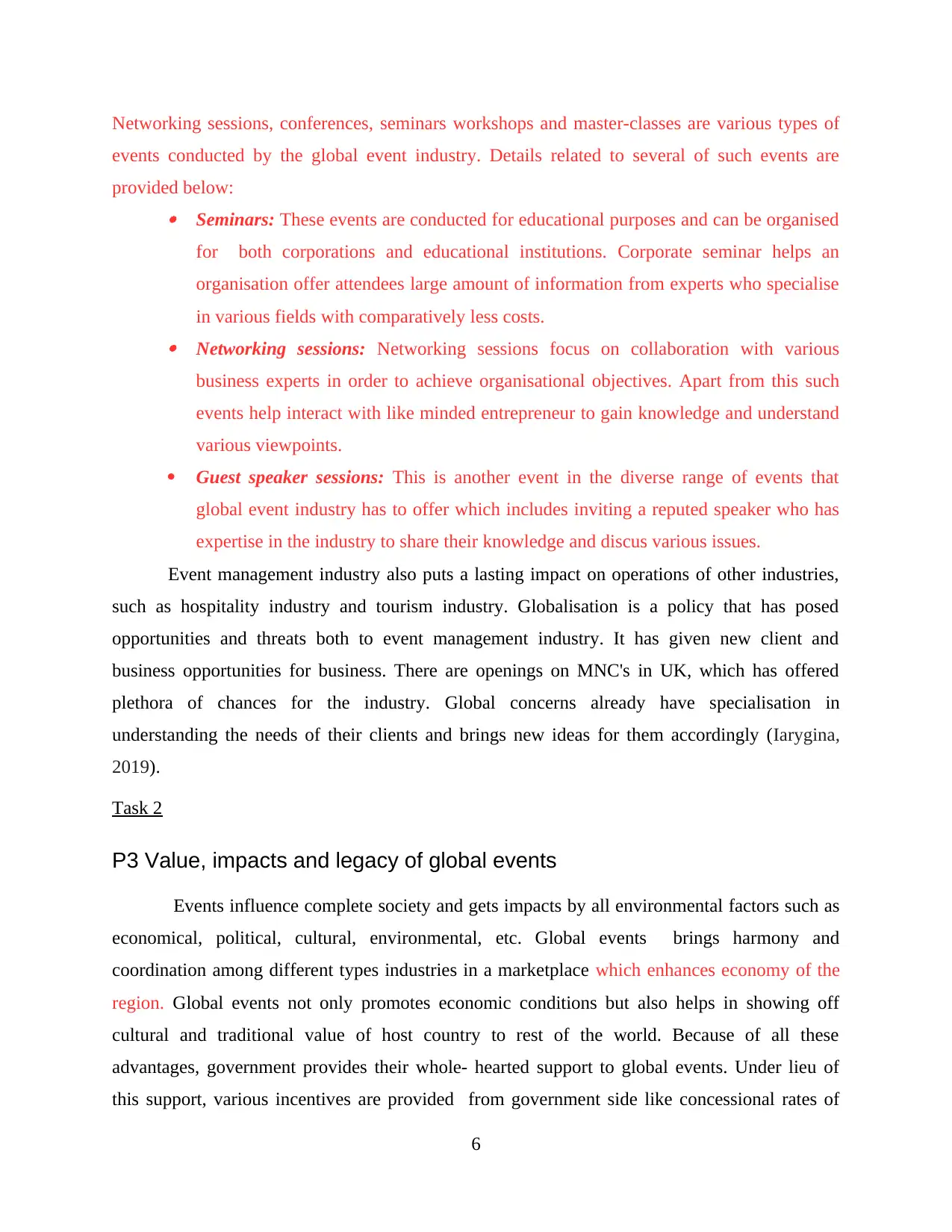
Networking sessions, conferences, seminars workshops and master-classes are various types of
events conducted by the global event industry. Details related to several of such events are
provided below:
Seminars: These events are conducted for educational purposes and can be organised
for both corporations and educational institutions. Corporate seminar helps an
organisation offer attendees large amount of information from experts who specialise
in various fields with comparatively less costs.
Networking sessions: Networking sessions focus on collaboration with various
business experts in order to achieve organisational objectives. Apart from this such
events help interact with like minded entrepreneur to gain knowledge and understand
various viewpoints.
Guest speaker sessions: This is another event in the diverse range of events that
global event industry has to offer which includes inviting a reputed speaker who has
expertise in the industry to share their knowledge and discus various issues.
Event management industry also puts a lasting impact on operations of other industries,
such as hospitality industry and tourism industry. Globalisation is a policy that has posed
opportunities and threats both to event management industry. It has given new client and
business opportunities for business. There are openings on MNC's in UK, which has offered
plethora of chances for the industry. Global concerns already have specialisation in
understanding the needs of their clients and brings new ideas for them accordingly (Iarygina,
2019).
Task 2
P3 Value, impacts and legacy of global events
Events influence complete society and gets impacts by all environmental factors such as
economical, political, cultural, environmental, etc. Global events brings harmony and
coordination among different types industries in a marketplace which enhances economy of the
region. Global events not only promotes economic conditions but also helps in showing off
cultural and traditional value of host country to rest of the world. Because of all these
advantages, government provides their whole- hearted support to global events. Under lieu of
this support, various incentives are provided from government side like concessional rates of
6
events conducted by the global event industry. Details related to several of such events are
provided below:
Seminars: These events are conducted for educational purposes and can be organised
for both corporations and educational institutions. Corporate seminar helps an
organisation offer attendees large amount of information from experts who specialise
in various fields with comparatively less costs.
Networking sessions: Networking sessions focus on collaboration with various
business experts in order to achieve organisational objectives. Apart from this such
events help interact with like minded entrepreneur to gain knowledge and understand
various viewpoints.
Guest speaker sessions: This is another event in the diverse range of events that
global event industry has to offer which includes inviting a reputed speaker who has
expertise in the industry to share their knowledge and discus various issues.
Event management industry also puts a lasting impact on operations of other industries,
such as hospitality industry and tourism industry. Globalisation is a policy that has posed
opportunities and threats both to event management industry. It has given new client and
business opportunities for business. There are openings on MNC's in UK, which has offered
plethora of chances for the industry. Global concerns already have specialisation in
understanding the needs of their clients and brings new ideas for them accordingly (Iarygina,
2019).
Task 2
P3 Value, impacts and legacy of global events
Events influence complete society and gets impacts by all environmental factors such as
economical, political, cultural, environmental, etc. Global events brings harmony and
coordination among different types industries in a marketplace which enhances economy of the
region. Global events not only promotes economic conditions but also helps in showing off
cultural and traditional value of host country to rest of the world. Because of all these
advantages, government provides their whole- hearted support to global events. Under lieu of
this support, various incentives are provided from government side like concessional rates of
6
⊘ This is a preview!⊘
Do you want full access?
Subscribe today to unlock all pages.

Trusted by 1+ million students worldwide
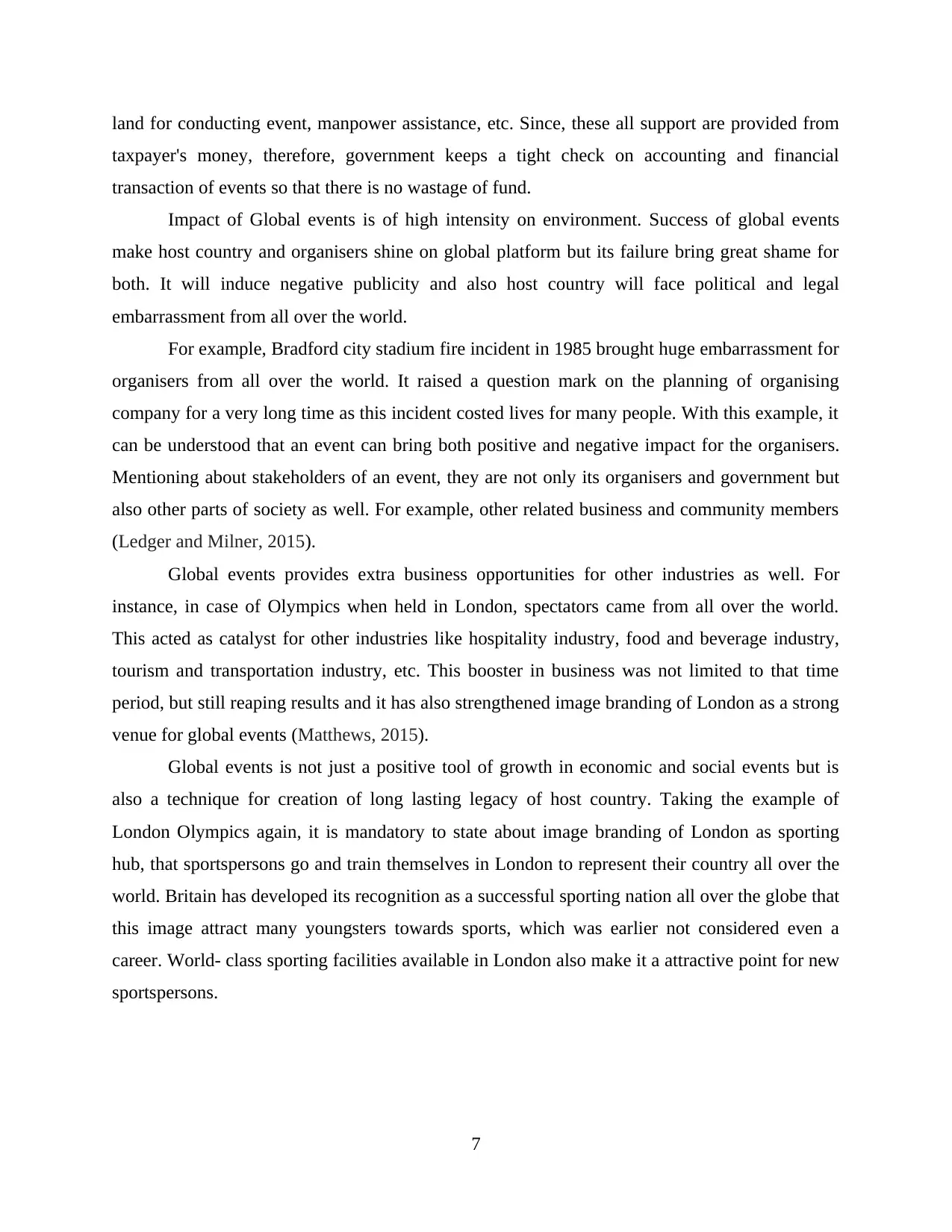
land for conducting event, manpower assistance, etc. Since, these all support are provided from
taxpayer's money, therefore, government keeps a tight check on accounting and financial
transaction of events so that there is no wastage of fund.
Impact of Global events is of high intensity on environment. Success of global events
make host country and organisers shine on global platform but its failure bring great shame for
both. It will induce negative publicity and also host country will face political and legal
embarrassment from all over the world.
For example, Bradford city stadium fire incident in 1985 brought huge embarrassment for
organisers from all over the world. It raised a question mark on the planning of organising
company for a very long time as this incident costed lives for many people. With this example, it
can be understood that an event can bring both positive and negative impact for the organisers.
Mentioning about stakeholders of an event, they are not only its organisers and government but
also other parts of society as well. For example, other related business and community members
(Ledger and Milner, 2015).
Global events provides extra business opportunities for other industries as well. For
instance, in case of Olympics when held in London, spectators came from all over the world.
This acted as catalyst for other industries like hospitality industry, food and beverage industry,
tourism and transportation industry, etc. This booster in business was not limited to that time
period, but still reaping results and it has also strengthened image branding of London as a strong
venue for global events (Matthews, 2015).
Global events is not just a positive tool of growth in economic and social events but is
also a technique for creation of long lasting legacy of host country. Taking the example of
London Olympics again, it is mandatory to state about image branding of London as sporting
hub, that sportspersons go and train themselves in London to represent their country all over the
world. Britain has developed its recognition as a successful sporting nation all over the globe that
this image attract many youngsters towards sports, which was earlier not considered even a
career. World- class sporting facilities available in London also make it a attractive point for new
sportspersons.
7
taxpayer's money, therefore, government keeps a tight check on accounting and financial
transaction of events so that there is no wastage of fund.
Impact of Global events is of high intensity on environment. Success of global events
make host country and organisers shine on global platform but its failure bring great shame for
both. It will induce negative publicity and also host country will face political and legal
embarrassment from all over the world.
For example, Bradford city stadium fire incident in 1985 brought huge embarrassment for
organisers from all over the world. It raised a question mark on the planning of organising
company for a very long time as this incident costed lives for many people. With this example, it
can be understood that an event can bring both positive and negative impact for the organisers.
Mentioning about stakeholders of an event, they are not only its organisers and government but
also other parts of society as well. For example, other related business and community members
(Ledger and Milner, 2015).
Global events provides extra business opportunities for other industries as well. For
instance, in case of Olympics when held in London, spectators came from all over the world.
This acted as catalyst for other industries like hospitality industry, food and beverage industry,
tourism and transportation industry, etc. This booster in business was not limited to that time
period, but still reaping results and it has also strengthened image branding of London as a strong
venue for global events (Matthews, 2015).
Global events is not just a positive tool of growth in economic and social events but is
also a technique for creation of long lasting legacy of host country. Taking the example of
London Olympics again, it is mandatory to state about image branding of London as sporting
hub, that sportspersons go and train themselves in London to represent their country all over the
world. Britain has developed its recognition as a successful sporting nation all over the globe that
this image attract many youngsters towards sports, which was earlier not considered even a
career. World- class sporting facilities available in London also make it a attractive point for new
sportspersons.
7
Paraphrase This Document
Need a fresh take? Get an instant paraphrase of this document with our AI Paraphraser
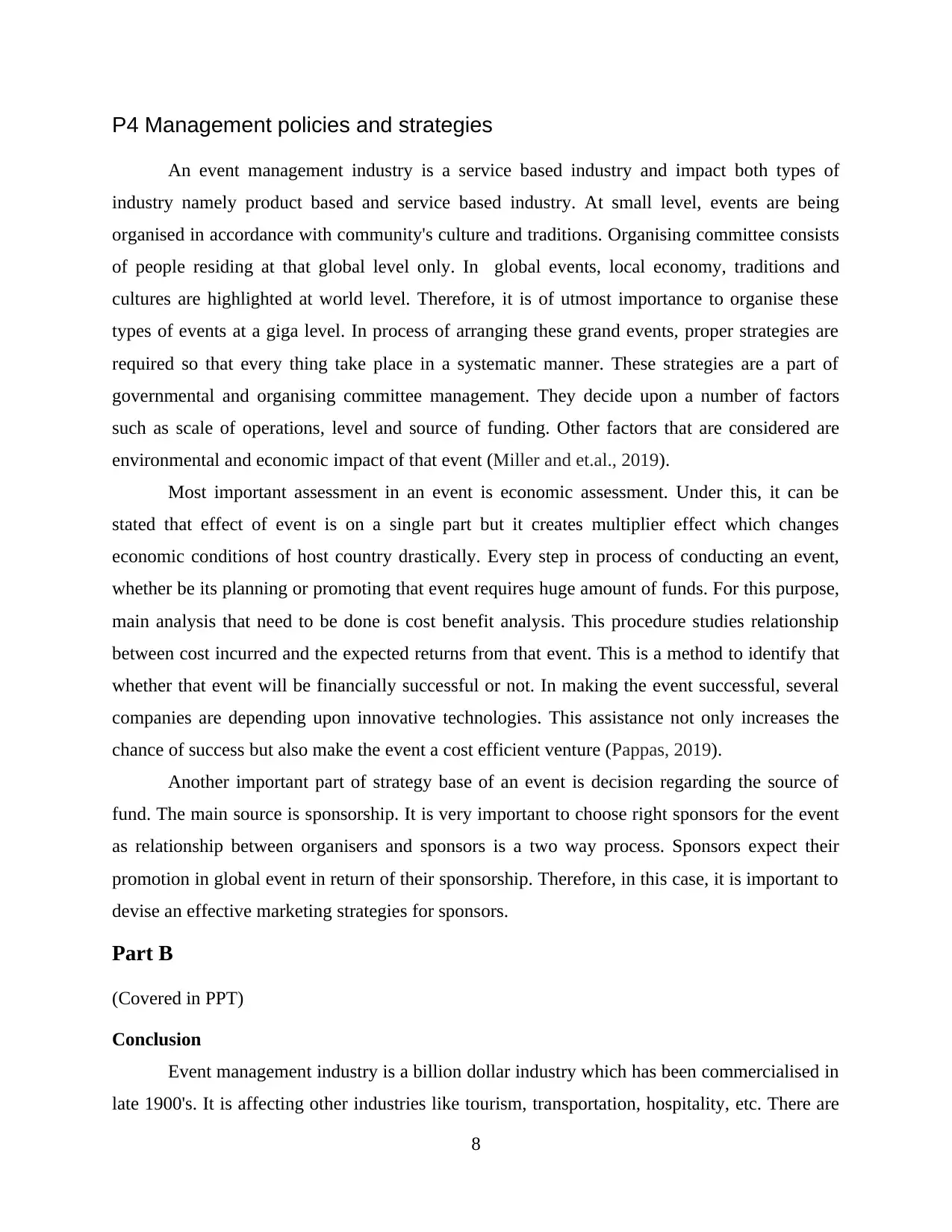
P4 Management policies and strategies
An event management industry is a service based industry and impact both types of
industry namely product based and service based industry. At small level, events are being
organised in accordance with community's culture and traditions. Organising committee consists
of people residing at that global level only. In global events, local economy, traditions and
cultures are highlighted at world level. Therefore, it is of utmost importance to organise these
types of events at a giga level. In process of arranging these grand events, proper strategies are
required so that every thing take place in a systematic manner. These strategies are a part of
governmental and organising committee management. They decide upon a number of factors
such as scale of operations, level and source of funding. Other factors that are considered are
environmental and economic impact of that event (Miller and et.al., 2019).
Most important assessment in an event is economic assessment. Under this, it can be
stated that effect of event is on a single part but it creates multiplier effect which changes
economic conditions of host country drastically. Every step in process of conducting an event,
whether be its planning or promoting that event requires huge amount of funds. For this purpose,
main analysis that need to be done is cost benefit analysis. This procedure studies relationship
between cost incurred and the expected returns from that event. This is a method to identify that
whether that event will be financially successful or not. In making the event successful, several
companies are depending upon innovative technologies. This assistance not only increases the
chance of success but also make the event a cost efficient venture (Pappas, 2019).
Another important part of strategy base of an event is decision regarding the source of
fund. The main source is sponsorship. It is very important to choose right sponsors for the event
as relationship between organisers and sponsors is a two way process. Sponsors expect their
promotion in global event in return of their sponsorship. Therefore, in this case, it is important to
devise an effective marketing strategies for sponsors.
Part B
(Covered in PPT)
Conclusion
Event management industry is a billion dollar industry which has been commercialised in
late 1900's. It is affecting other industries like tourism, transportation, hospitality, etc. There are
8
An event management industry is a service based industry and impact both types of
industry namely product based and service based industry. At small level, events are being
organised in accordance with community's culture and traditions. Organising committee consists
of people residing at that global level only. In global events, local economy, traditions and
cultures are highlighted at world level. Therefore, it is of utmost importance to organise these
types of events at a giga level. In process of arranging these grand events, proper strategies are
required so that every thing take place in a systematic manner. These strategies are a part of
governmental and organising committee management. They decide upon a number of factors
such as scale of operations, level and source of funding. Other factors that are considered are
environmental and economic impact of that event (Miller and et.al., 2019).
Most important assessment in an event is economic assessment. Under this, it can be
stated that effect of event is on a single part but it creates multiplier effect which changes
economic conditions of host country drastically. Every step in process of conducting an event,
whether be its planning or promoting that event requires huge amount of funds. For this purpose,
main analysis that need to be done is cost benefit analysis. This procedure studies relationship
between cost incurred and the expected returns from that event. This is a method to identify that
whether that event will be financially successful or not. In making the event successful, several
companies are depending upon innovative technologies. This assistance not only increases the
chance of success but also make the event a cost efficient venture (Pappas, 2019).
Another important part of strategy base of an event is decision regarding the source of
fund. The main source is sponsorship. It is very important to choose right sponsors for the event
as relationship between organisers and sponsors is a two way process. Sponsors expect their
promotion in global event in return of their sponsorship. Therefore, in this case, it is important to
devise an effective marketing strategies for sponsors.
Part B
(Covered in PPT)
Conclusion
Event management industry is a billion dollar industry which has been commercialised in
late 1900's. It is affecting other industries like tourism, transportation, hospitality, etc. There are
8

immense chances of growth and expansion in this business line. It is also affecting the economic
conditions of the hosting country or organisers. It is necessary to scan internal and external
environment before organising any global event as they have lasting impacts on success of event.
9
conditions of the hosting country or organisers. It is necessary to scan internal and external
environment before organising any global event as they have lasting impacts on success of event.
9
⊘ This is a preview!⊘
Do you want full access?
Subscribe today to unlock all pages.

Trusted by 1+ million students worldwide
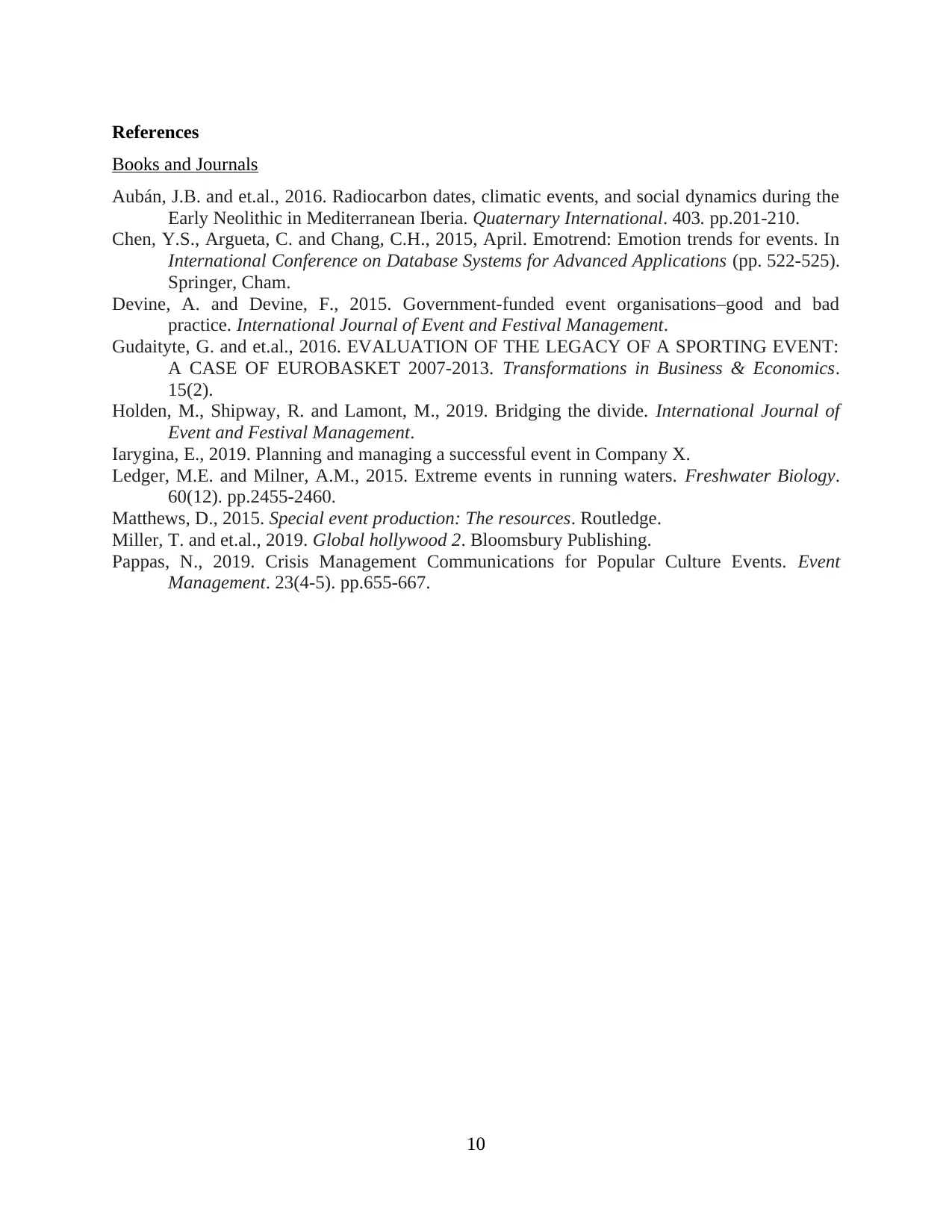
References
Books and Journals
Aubán, J.B. and et.al., 2016. Radiocarbon dates, climatic events, and social dynamics during the
Early Neolithic in Mediterranean Iberia. Quaternary International. 403. pp.201-210.
Chen, Y.S., Argueta, C. and Chang, C.H., 2015, April. Emotrend: Emotion trends for events. In
International Conference on Database Systems for Advanced Applications (pp. 522-525).
Springer, Cham.
Devine, A. and Devine, F., 2015. Government-funded event organisations–good and bad
practice. International Journal of Event and Festival Management.
Gudaityte, G. and et.al., 2016. EVALUATION OF THE LEGACY OF A SPORTING EVENT:
A CASE OF EUROBASKET 2007-2013. Transformations in Business & Economics.
15(2).
Holden, M., Shipway, R. and Lamont, M., 2019. Bridging the divide. International Journal of
Event and Festival Management.
Iarygina, E., 2019. Planning and managing a successful event in Company X.
Ledger, M.E. and Milner, A.M., 2015. Extreme events in running waters. Freshwater Biology.
60(12). pp.2455-2460.
Matthews, D., 2015. Special event production: The resources. Routledge.
Miller, T. and et.al., 2019. Global hollywood 2. Bloomsbury Publishing.
Pappas, N., 2019. Crisis Management Communications for Popular Culture Events. Event
Management. 23(4-5). pp.655-667.
10
Books and Journals
Aubán, J.B. and et.al., 2016. Radiocarbon dates, climatic events, and social dynamics during the
Early Neolithic in Mediterranean Iberia. Quaternary International. 403. pp.201-210.
Chen, Y.S., Argueta, C. and Chang, C.H., 2015, April. Emotrend: Emotion trends for events. In
International Conference on Database Systems for Advanced Applications (pp. 522-525).
Springer, Cham.
Devine, A. and Devine, F., 2015. Government-funded event organisations–good and bad
practice. International Journal of Event and Festival Management.
Gudaityte, G. and et.al., 2016. EVALUATION OF THE LEGACY OF A SPORTING EVENT:
A CASE OF EUROBASKET 2007-2013. Transformations in Business & Economics.
15(2).
Holden, M., Shipway, R. and Lamont, M., 2019. Bridging the divide. International Journal of
Event and Festival Management.
Iarygina, E., 2019. Planning and managing a successful event in Company X.
Ledger, M.E. and Milner, A.M., 2015. Extreme events in running waters. Freshwater Biology.
60(12). pp.2455-2460.
Matthews, D., 2015. Special event production: The resources. Routledge.
Miller, T. and et.al., 2019. Global hollywood 2. Bloomsbury Publishing.
Pappas, N., 2019. Crisis Management Communications for Popular Culture Events. Event
Management. 23(4-5). pp.655-667.
10
1 out of 10
Related Documents
Your All-in-One AI-Powered Toolkit for Academic Success.
+13062052269
info@desklib.com
Available 24*7 on WhatsApp / Email
![[object Object]](/_next/static/media/star-bottom.7253800d.svg)
Unlock your academic potential
Copyright © 2020–2025 A2Z Services. All Rights Reserved. Developed and managed by ZUCOL.





